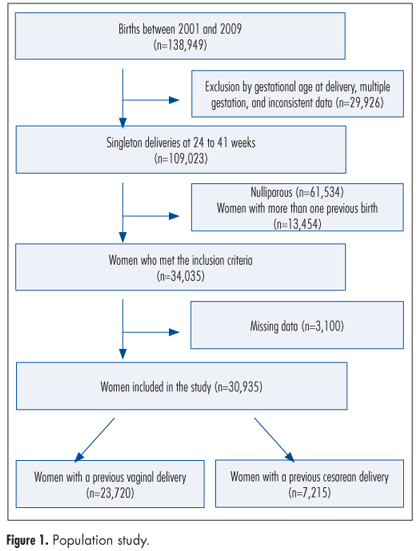Revista Brasileira de Ginecologia e Obstetrícia. 2013;35(4):148-152

PURPOSE: To examine obstetric outcomes in the second birth of women who had undergone a previous cesarean delivery. METHODS: This was a large hospital-based retrospective cohort study. We included pregnant women who had a previous delivery (vaginal or cesarean) attending their second birth from 2001 to 2009. Main inclusion criteria were singleton pregnancies and delivery between a gestation of 24 and 41 weeks. Two cohorts were selected, being women with a previous cesarean delivery (n=7,215) and those with a vaginal one (n=23,720). Both groups were compared and logistic regression was performed to adjust for confounding variables. The obstetric outcomes included uterine rupture, placenta previa, and placental-related complications such as placental abruption, preeclampsia, and spontaneous preterm delivery. RESULTS: Women with previous cesarean delivery were more likely to have adverse outcomes such as uterine rupture (OR=12.4, 95%CI 6.8-22.3), placental abruption (OR=1.4, 95%CI 1.1-2.1), preeclampsia (OR=1.4, 95%CI 1.2-1.6), and spontaneous preterm delivery (OR=1.4, 95%CI 1.1-1.7). CONCLUSIONS: Individuals with previous cesarean section have adverse obstetric outcomes in the subsequent pregnancy, including uterine rupture, and placental-related disorders such as preeclampsia, spontaneous preterm delivery, and placental abruption.
Search
Search in:


Comments